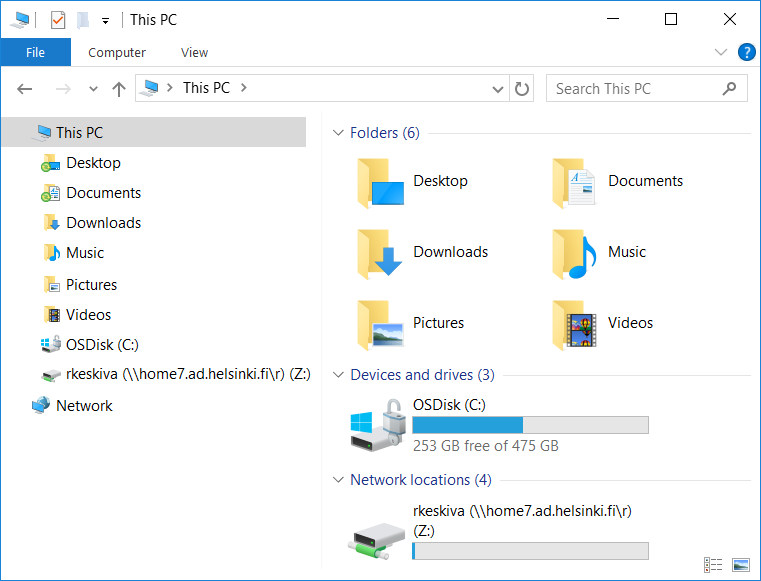Home directory and remote access to it
Your personal home directory (the Z drive) is the safest and most convenient place for storing your current work files on university computers. Files in the home directory are saved on the university’s network drive and you can access them from any university computer where you log in with your own username. Furthermore, files are backed up automatically once a day.
The storage quota for a home directory is 100 gigabytes. Due to the restricted space, your home directory does not have room for numerous large files, such as videos and photo collections. It is recommended that if you have a high number of files, you should archive them in the cloud.
If you want to, you can also access your home directory at the university (the Z drive) outside the university network, e.g. from your home computer. You can do this by setting up your network drive to be used from your home computer, which enables you to edit and save files in it as easily as the files on your own computer’s hard drive, provided that you have a VPN connection or are in the Eduroam network.
Adding the network drive on your own computer
In practice, you can do this by connecting your computer to the university network (for this, you will need a VPN connection through a client) and then telling the operating system to connect your Z drive, making it a part of the drive array. After this, the shortcut for your Z drive will be displayed in the This PC window and the files on the drive can be opened and saved in the same way as when using a USB memory stick connected to the computer, for instance (see the example in the image below).

Saving files in OneDrive
You can also save your study-related materials, such as written assignments and presentations, in the OneDrive cloud storage service offered by the University of Helsinki (cloud = network drive space usually on the servers of a commercial operator) where you have 1 terabyte (1,000 GB) of storage space available. This is substantially more than the 100 gigabyte default space on your Z: network drive. For this reason, the cloud is a good way of storing all those assignments and study materials that do not fit into your home directory.
However, especially fetching large amounts of data and saving it in the cloud is slightly slower than when using the university’s network drive. On your home computer, you can use the OneDrive application, delivered with the Office suite, in order to define the folder on your computer that is to be synchronised with your cloud storage space. By enabling synchronisation, you can work on the files directly on your computer while your changes are automatically saved in the cloud.
With the OneDrive service mobile applications, files are also easier to access with different devices than files saved in the home directory. Another difference when compared to the home directory is that folders or files in the cloud can also be shared with other persons.
